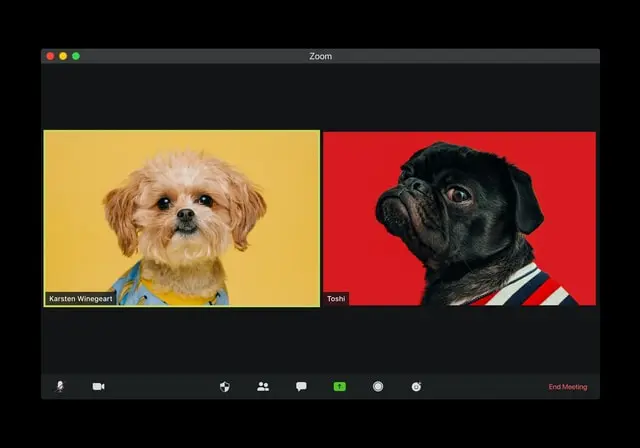In light of recent events, Zoom has become one of the most popular video-calling apps. Its service is completely free, but what do the developers of this app get in the end?
Is Zoom profitable right now and how it makes money
You’ve probably heard about Zoom at least once. If you haven’t, you should definitely try this app. Not only does it allow you to get creative while calling your coworkers or just your friends, but it’s also completely free.
Back in early 2020, when the pandemic had just begun and almost all companies were forced to move to remote work – here entered the arena – no, not Skype, but its counterpart – Zoom. And this app deservedly gained its popularity. Even though many people continued to use Skype, Zoom quickly took over and even made its way into popular culture, such as the video of the lawyer with a kitten filter, which exploded on the Internet.
Zoom not only made it possible to video call and just have fun with it, but it also came into the lives of many at the right time when the business of many was threatened. Free Zoom was available to everyone, you could use it as much as you wanted and whenever you wanted, it had no hard limitations, and that’s how the developers succeeded.
The popularity is there, but how do they make money? Is it possible to get money from a project that offers a free app? This will be described below.
What are Zoom’s background
To understand the success of this app and how it brought a huge amount of dollars to its developers, we must first understand its history.
Actually, Zoom was originally not Zoom at all. Yes, his first name was Saasbee. And Zoom isn’t as new as you might think. It isn’t three or five years old, but ten! For seven years it was unnoticed before the pandemic happened. And its creator is Eric Yuan, who used to be a Cisco employee. The company, by the way, has a similar project as Zoom, only it’s called Webex. Anyway, Eric Yuan left the company and decided that he had to do a better project. And he did, of course, with the help of 40 other people.
And now Zoom isn’t only free of charge, unlike its competitors, but also offers more options for paying plans. Yes, it’s the paid plans that make the company money. And that’s what we’re going to talk about a little bit more about next.
How is Zoom commercially successfull
Zoom is free, that’s a fact. However, if you want to improve the app, its features and customize it for you, please donate money to maintain this project. And in return, you will get a lot of cool features. Moreover, you have the choice of exactly what you want and for how much. This method is called “freemium” in business. If you don’t want to pay money – you have a basic set of everything you need to work. This isn’t like some services, where the free version entices you to buy a paid subscription.
However, if you miss something in the work of Zoom, there is a whole set of as many as four categories, which have their own plans and suggestions. You can read about them in more detail below.
Zoom Meetings & Chats
General meetings and video calls in Zoom can include up to 100 people. That is, if you need to get together with friends or even just hold a lesson or a lecture for 40 minutes – it’s a great option where you don’t need to pay anything. Yes, you read it right, 40 minutes is the limit of the Basic Plan video conference. For small gatherings and short courses, it’s okay, but if you have business conversations or just want to be able to sit longer without having to constantly re-enter the chat room, then it’s worth considering the paid plans.
- Pro subscribers can, for $14.99 a month per license, host meetings with up to 100 without worrying about the time limit (30 hours!). In addition, they get 1GB of cloud storage for recording meeting playback, and they also get an option for social media streaming
- Business subscribers can host meetings with up to 300 participants. They also get features such as single sign-on, recording transcripts, managed domains, and company branding. The business plan goes for $19.99/month/license
- Zoom’s Enterprise plan subscribers get all the benefits of the business plan and more. Subscribers can host meetings with up to 500 participants, and they also receive unlimited cloud storage. The enterprise plan also costs 19.99/month/license
Rooms and Workspaces
There is another thing in Zoom that will simplify your teamwork for a fee and simply improve the quality. Literally, for $49 a month (or $41.58 per month when billed annually) you get access to “the modern workspaces for hybrid teams”. Zoom Rooms offers users video chatting in high-definition 1080p HD, including audio. And if you host webinars, you can invite up to 10,000 viewers with this feature.
Zoom Rooms also makes sure that you always have an integrated calendar at your fingertips during the meeting.
Zoom Phone
If it’s the case you rarely have the opportunity to attend meetings, but the case must be resolved urgently, Zoom has the ability to call as a public phone. The difference between a regular call and a call in Zoom is that your call will be made through Zoom and it’s convenient when you don’t have certain people in contacts, but they are still available via Zoom. This option is suitable for teams from different corners of the planet, which are hybrid, etc.
The following features are:
- Intelligent Call Routing & Auto Attendants
- Voicemail & Call Recording
- Secure HD Voice
- Integrations with Microsoft Office, Salesforce, and Google Workspace
Pro plan costs $10, and Pro Global offers 40 or more countries for $20 a month
Zoom Video Webinar
For those who have their own projects and you want to arrange webinars, then Zoom has a plan specifically for this purpose. The cool thing is that you can attract up to 10,000 people to your webinar. A webinar isn’t quite a video conference, and the difference is that only the host can broadcast, while everyone else can only participate in the chat, answer interactive questions and surveys, and of course, watch you.
However, you also need to pay a lot of money. At least a plan of up to 10,000 people will cost you $6,490 per month. However, smaller webinars will start at $79.
Moreover, Zoom also makes money by offering special packages for Education, Finance, Healthcare, and Government organizations and its marketplace where third-party apps like Slack, Salesforce, and Trello can be installed.






